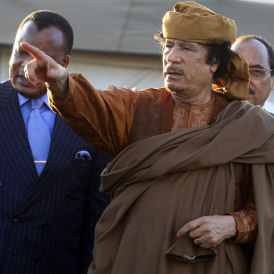Libya: Gaddafi ‘accepts African Union peace plan’
Libya’s Colonel Gaddafi accepts a roadmap for ending the conflict, but Jonathan Rugman says the rebels will find any deal which sees Gaddafi remain in power “difficult, but not impossible” to accept.

South African President Jacob Zuma said Gaddafi had accepted a peace plan for war-torn Libya, after negotiations with the delegation of African leaders.
He urged NATO to suspend air strikes on government targets to “give ceasefire a chance”.
Mr Zuma said: “The brother leader delegation has accepted the roadmap as presented by us. We have to give ceasefire a chance.”
The brother leader delegation has accepted the roadmap as presented by us. South Africa’s Jacob Zuma
But there was no confirmation of whether Gaddafi stepping down would be part of the plan – and the opposition in Benghazi have long made it clear that they will not accept a future for Libya which has Gaddafi in it.
The African Union (AU) will now travel to Benghazi for talks with the rebel council.
As Gaddafi made his first appearance to foreign media in weeks, making the “V” sign for victory to a crowd of supporters in Tripoli, British official remained unconvinced by his pledge for peace, saying: “We will judge Gaddafi by his actions not his words.”
Will Gaddafi go?
The defection of Moussa Koussa, Libya's Foreign Minister, has not proved to be a "tipping point" which would trigger the regime's collapse, writes Channel 4 News Foreign Affairs Correspondent Jonathan Rugman from Tripoli.
The rebels may have to consider a ceasefire deal which leaves Colonel Gaddafi ensconced in Tripoli, which they will find it difficult though not impossible to accept.
It feels as if Libya will stay geographically divided between east and west, until the military balance changes, or Gaddafi runs out of oil and money, or the loyalty of his sons and commanders reaches a low ebb.
Read more from Jonathan Rugman on Libya: last night in Tripoli
Fighting
AU Commissioner for Peace and Security, Ramtane Lamamra, said any deal would include the delivery of humanitarian aid, protection of foreigners, dialogue and “the establishment of an inclusive transition period with a view to adopting and implementing necessary political reforms.”
He said the AU was ready to work with NATO, the United Nations and the Arab League to monitor a ceasefire, and added that he hoped the proposal was “broad enough” to begin negotiations with anti-Gaddafi fighters in Benghazi.
The hopes for peace come after another heavy weekend of fighting across Libya. NATO said it had increased its air attacks over the weekend under its mandate to protect civilians.
Fighting centred on Ajdabiya, 150km from Benghazi, which suffered a major assault by pro-Gaddafi forces – but with the support of NATO, the rebels remained in control of the town.
In an exclusive interview with Channel 4 News Foreign Affairs Correspondent Jonathan Rugman, Libyan Foreign Minister Adul Ati Al-Obeidi said the regime would work for a “real ceasefire”. Watch the video below.